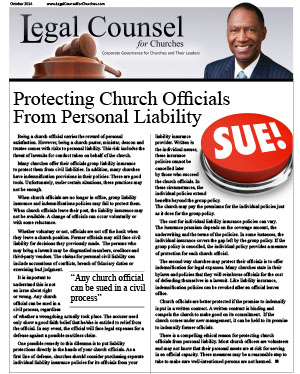Churches rely on a number of individuals to carry out their missions. Some of these persons serve in official clergy positions. Others may be employees and volunteers who perform routine operations. In all cases, churches should be clear to all who have explicit authority to represent their ministries.
Individuals who represent others are known as agents. Church agents may have specific authority to act on behalf of the church. These actions may include signing contracts, counseling individuals, speaking to the public and/or making purchases. Each action may subject the church to financial obligations and legal liabilities.
Agents are important to churches because people are needed to conduct ministry and administrative functions. Church agents represent the church to business partners, community members, the congregation and government officials. To many, the face of the church is often the agent through which contact is made.
Church management should be fully aware of who are church agents. Church agents can be visible, public figures such as the pastor, deacons and trustees. Depending on the authority given, church agents can also be others who serve on committees, auxiliaries and ministries.
Churches should be intentional about who has agency authority. The reason is an agent may have special powers to act as if the church has approved his/her actions. Depending on the circumstances, a church may not be able to renounce the conduct of its agents. This could become particularly troublesome if in fact an agent exceeds the church’s instructions.
Agents are an essential part of a church’s operation. The risks to having agents can be minimized through a set of practical measures. Start a conversation with your church management to make sure everyone is on the same page.
Whether the church recognizes individuals as such, the church has agents. The key for management is to put safeguards in place to protect the church from unintentional liabilities. Going forward, you can limit the risks to the church by taking a few proactive steps.
Tips for Managing Church Agents
Identify Church Agents
Church agents should be identified and their authority reaffirmed periodically. This includes making a list of who conducts church business with third parties. This list will give the church a roster of who has responsibility for certain church functions.
Position Descriptions for Agents
A common mistake made by church agents is acting in a way that exceeds their authority. This can happen when church officials misunderstand their duties and roles. The church should distribute to its agents position descriptions that clearly define the role and limits of officials’ authority. This will inform agents as to their boundaries for making decisions.
Correct Mistakes Quickly
The church may need to quickly disavow any activity of an agent that exceeds the authority given by the church. Failure to correct misdeeds promptly could obligate the church to live with the action.
A Written Policy
Churches should have a written policy that spells out the assignment and scope of its agents. The policy should set the groundwork on how agents are managed. A policy document on church agents is an important way a church can demonstrate it exercises reasonable corporate governance over agents.

